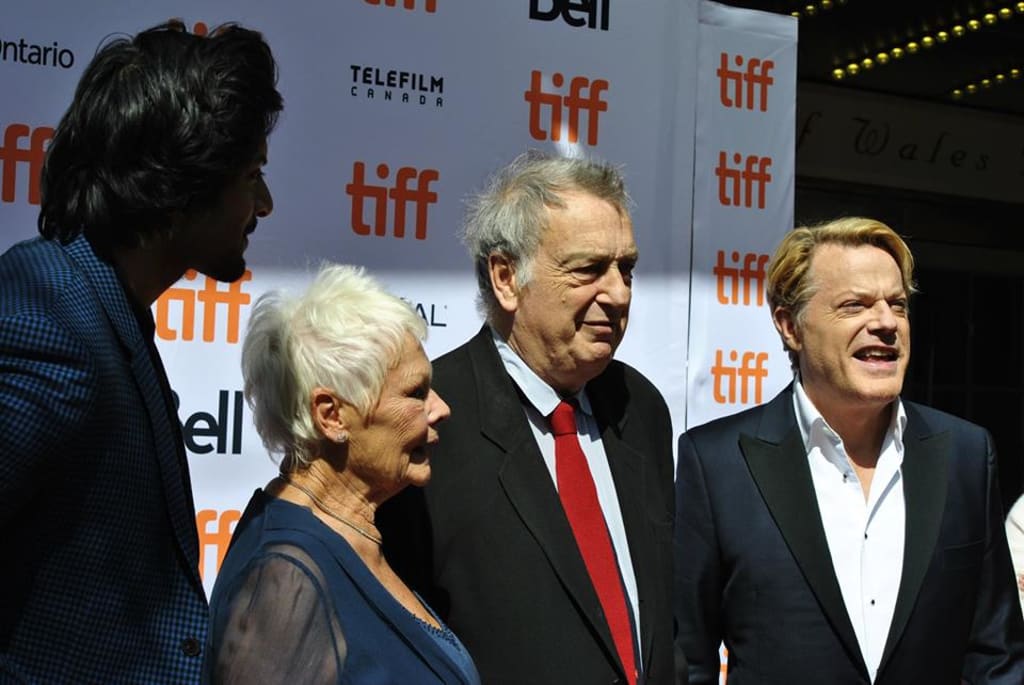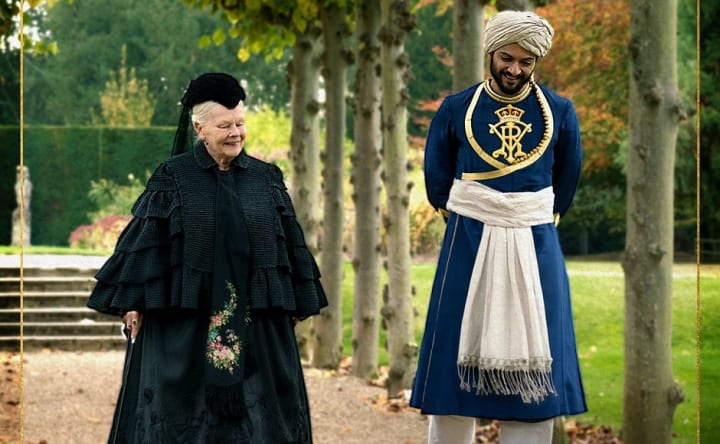The Tale of an Unsung Confidant of Queen Victoria
A Review of the Film 'Victoria and Abdul'

Abdul Karim was more than happy to travel to England to hand over a special valued coin brought out in commemoration of Queen Victoria's Golden Jubilee celebrations, as instructed by his boss in British India. The film, Victoria and Abdul, starts telling its story from there and how a stay of one year had been extended to more than a decade. If someone is destined to become a servile, beat the best out of it. Perhaps, Abdul Karim, the character well played by Ali Fazal, might have no bad intentions at the outset to grab a special position in Queen Victoria's mind or life. Maybe he was not aware of the gravity of the protocol breach caused by him and that led to the intimidations at the realm of executive affairs. The relationship between the monarch and the servant hit so badly on an empire preserved by the biggest martinets the world has ever seen. Despite the warnings given by the sticklers of propriety at the royal household, the queen utilized her monarchic immunity to promote Ali to the position of Munshi and a close confidant. Abdul, a Hafiz who knows the 114 Suras of Quran by heart, as he claims, teaches the queen a few Hindi/Urdu words and that ignites the intense feelings on Indian things in her. Inspired by the explained taste of mango, the 'queen of all fruits' and chutney made out of it, she even asks the royal household to have someone sent to India to bring it over. Imagine the plight change of an introvert queen that frequently dozes off at the dining table to an active persona and a vibrant party lover. The temperamental peculiarity of a monarch 'disagreeably attached to power,' as she claims, has been portrayed brilliantly by Judi Dench, who is no stranger to acting in this role. She had her trials in this role earlier in 1997 for the film, Mrs. Brown and in 1998 for Shakespeare in Love.
Abdul didn't have any bad intentions at heart, but to be a blue-eyed boy in the hearts of his bosses, be it in India or abroad. The relationship with the queen also is nothing more than what he kept doing in India. But the boss that happened upon in England was unfortunately the queen and he didn't foresee any bad consequences in getting closer to her. But look at the hardbound branch of executives who has to follow the procedures and protocols attached to the monarchy. Abdul Karim's proximity transforms a grouchy queen into a powerful monarch who reminds them that she is the queen and hers is the last word. At one point, she summons all the top brass and makes each of them take a vow that they would be courteous to the Munshi. Much to the dismay and distress, Abdul Karim, irrespective of the consequences, becomes a fair-haired part of queen's life. When someone gets escalated to the position of a confidant in politics bypassing all the norms existing, we all can imagine the roadblocks and conflict of interests. It really becomes a hard nut to crack when a monarch becomes a party to it. The royal lines make you laugh with all their tensions sans solutions. The dramas enacted in the inner circles could be no better portrayed than this wherever it may be.
Although, the story is largely dependent on real incidents happened from 1887, the scripting of the film was started from a book of the same name written by Shrabani Basu. While holidaying in the Isle of Wight, Shrabani chanced upon a painting of Karim at the Osborne House, a former resort belonged to Queen Victoria. Another picture of him, coupled with one of John Brown's at the old residence of the queen, brought a thought in her that Karim must have had a special place in queen's life and that led to writing a book in 2006. It took four years for Shrabani Basu to complete her book, although many original records were set afire previously immediately after the death of Queen Victoria. That was a calculated move by the then government to wipe that part of history off and preserve the queen's reputation 'clean from blemishes.' The writer went back to Agra, the place Abdul Karim started his journey and could find only his grave and no relatives whatsoever. The only information she could grab was that Abdul Karim passed away in 1909 and had no children. After the publication of the book in 2010, she had a good number of interviews in which she reiterated that she's still in search of his relatives. By knowing about the book, some of her relatives came up from Bangalore and pleased to provide her a few information. That led further to getting some original journals from a relative moved to Pakistan at the time of partition in 1947. After almost a century, when the original journals of Abdul Karim reached Shabani Basu from the initially unwilling relatives, they were so happy about her innovative moves from her side. The relatives were all, by and large, keeping a low profile, due to the portrayal of Abdul Karim as a never-do-well crook and idiot who tried to mislead the queen and the government for personal gains. Shrabani was instrumental for their family to rewrite the old chapter and become proud of the protagonist.
Lee Hall, the screenwriter and Stephen Frears, the director, had a tough time to bring back the old time and transforming the story into a costumed comedy for everyone to enjoy. Director Stephen Frears has, to a great extent, succeeded in portraying the conceits of a royal stiffness that's quite fragile and anything new would be a matter to be tripped up. Frears has outstanding directorial credits to his account for films like The Queen, Philomena, etc. Ali Fazal, a Bollywood pick with his outstanding histrionics, has made Abdul Karim's role memorable. The supporting actors have done their best in their assigned roles. Tim Piggot-Smith, who acted as Major General Sir Henry Frederick Cavendish Ponsonby couldn't see the release of this movie, unfortunately, as he passed away in April 2017. A great actor, who would be fondly remembered for his role in The Jewel in the Crown that fetched him the best actor award in BAFTA, 1985. Eddie Izzard, a renowned TV actor and stand-up comedian, despite his short stature, has put up a brilliant performance as Prince Albert. So is with Michael Gambon as the then Conservative Prime Minister Lord Salisbury.
There are mixed criticisms on the movie, as some say that the queen was depicted as a lethargic head, tarnishing the image that has been carried along. They say that the film is bent upon letting a powerful queen off the hook of a great obligation and turned down as irresponsible. Some others say that it's a realistic portrayal of a progressive outrider who stood in the way of white racists ruled over.
The film, as one of the official entries from the UK, was a crowd puller in the recently concluded Toronto International Film Festival (TIFF) 2017.
Shrabani Basu - Story Writer

Shrabani Basu

Judi Dench & Ali Fazal, in Victoria and Abdul
About the Creator
Suresh Nellikode
A shallow brook that babbles as loudest as it can. A word lover. So with its creators too. Love tea, scrumptious food, mountains, animals, flowers, stamps, coins, films, photography, theatre, wandering, acting and whatever you will.






Comments
There are no comments for this story
Be the first to respond and start the conversation.